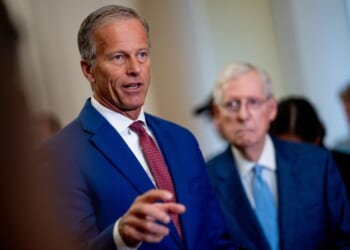The leadership rumours are back. Not against the hapless Kemi Badenoch — but against the Prime Minister, a man who swept to power on the back of a mammoth majority and a desperate need for change less than 18 months ago. Number 10, for its part, is panicking, with “friends” of Keir Starmer frantically briefing about the looming treachery of Wes Streeting — to go alongside that of Andy Burnham, even as Shabana Mahmood and Ed Miliband may yet make their own moves.
For a prime minister who won bigger than Thatcher to now be more Frank Spencer than Frank Underwood feels remarkable. Yet if you understand Starmer, and the wing of the Labour Party from which he comes, the explanation is actually quite simple: the Labour Right has always been allowed to play on “easy mode”. Rather than their inter-party disputes and policy integrity being scrutinised, they are, more often than not, given an easy ride — allowed to come to power without offering an actual plan for government.
This might seem surprising. After all, the Conservatives have always enjoyed greater support from the rich and powerful. And theirs is, since its inception, the party of the landed interest. Why would the “establishment”, as broadly conceived, have more sympathy with a nominally socialist party they don’t actively support?
The answer is structural: while the Tories are expected to generally run things, and guarantee a low-tax, low-regulation economy, the Labour Right is the linchpin holding the national stage of politics together; the metaphorical policeman enforcing an ideally static Overton Window. It undermines, and subverts, the Labour Left, so it can never exert any real power (though the Labour Left does its bit in this regard as well), while ensuring the Tories never swing too far to the Right — particularly on migration — especially if this conflicts with the perceived interests of business.
Rather than standing for anything, then, the Labour Right represents resistance. The triumph of Thatcherism, and the end of the Cold War, dissolved the old truths, so now their politics is one of negation — Tories to their Right, socialists to their Left. This is why “stop Corbyn” and “stop Brexit” will invariably become “stop Farage” at the next election. The Labour Right defines itself against propositional politics.
“Just as Labour is looking at other leaders, the public is looking for other parties.”
That posture makes for a puerile relationship to enterprise. In the mind of the Labour Right, the definitive “‘voice of business” is an investor on Dragon’s Den. The reality of commerce, to them, isn’t family firms, high street independents, or even manufacturing, but big supermarkets and “consultants” with large followings on LinkedIn. These are people who wax lyrical about business, and yet rarely seem to have worked in it themselves.
It wasn’t always like this. Before the triumph of Thatcherism, the term Labour Right referred to social democrats who were socially conservative and vehemently anti-communist: Ernest Bevin and Hugh Gaitskell being the tendency’s standard-bearers. Now, it simply means the microwaved imitators of Blairism: Liz Kendall, Peter Kyle, Wes Streeting, Labour Together. For these figures, anyone to the Left of Gordon Brown is considered untouchable, with even the former chancellor often under suspicion.
Despite not being the default party of government, then, the Labour Right is more important in holding the national “consensus” together than anyone else. It is this quality which endows it with a certain goodwill from much of the media. Nobody seriously thinks a Tory with Peter Mandelson’s rap sheet could have become the ambassador to Washington. The temptation might be to punish the transgressions of such people — but if the likes of Jonathan Powell, Mandelson and Alastair Campbell were discarded, then the party of labour might actually represent the working class. And of course that can’t happen.
This arrangement functioned for as long as the economy grew and the fundamentals of political life — like membership of the EU, or subordination to Washington on foreign policy — were settled. Under such conditions, which prevailed between the fall of the Soviet Union and the financial crash of 2008, the Labour Right didn’t need to offer intellectual leadership to the country. Indeed, the very essence of Blairism was to intensify what preceded it, from PFI to privatisations and an emphasis on finance and real estate as the country’s economic engines. But in 2024, after 16 years of economic stagnation and growing political discontent — from Brexit to asylum policy, and even the very idea of what it means to be British — that was precisely what the moment demanded.
Writing in the Financial Times earlier this week, Martin Wolf observed the “disturbing victory of Old Labour over New Labour”. A rise in the basic rate of income tax, almost certain to be announced in the budget later this month, will mean others diagnose Starmer’s as a Left-wing project. But that is to misread what is happening. The Labour Right didn’t do any original thinking in its wilderness years. Not even Jeremy Corbyn stuffing them twice provided pause for thought, apparently. They believed — correctly as it turns out — that they simply needed to wrestle the party’s leadership back and wait their turn.
An attendant assumption was that the economy could manage itself, and growth would inevitably come back, a premise resulting from that same ideological capitulation of the Eighties. Its task was simply to be a more competent, humane administrator of a model not of their design. But that model is now broken, from migration to productivity, compounded by a crisis in elderly care: which means that taxes are ratcheting up. None of this has been the result of ideology, as Wolf might insinuate, for there is none. Their pitch was merely competence — and that has been thrown to the wind, as Starmer scrambles wildly for support, scrapping the two-child benefit cap, and even reconsidering compensating the WASPI women. It has no answers for a low-growth world; hence its disastrous first 18 months in office.
Unlike Blair, who inherited fiscal surpluses and rising productivity in 1997, Starmer really did have to make “difficult choices” on tax and spending. He swerved them and no one asked him the hard questions.
We can blame Britain’s electoral system for his easy ride: our two-party battles necessarily obscure political alternatives. The baton is simply passed back and forth, with the Labour Right operating as a “B team” for the Tories when they flounder. But rather than provide stability, this setup is now generating the opposite. The Labour Right openly defines itself against heterodoxy, self-criticism and dissent. So when it is wrong, like on Iraq or light-touch regulation with financial services before 2008, the consequences are uniquely disastrous. Something similar again appears to be unfolding.
Small wonder, then, that just as Labour is looking at other leaders, the public is looking for other parties. Last week one pollster, FindOutNow, gave a combined vote of more than 50% to Reform UK and the Greens. While the media might focus on both Farage and Polanski as talented communicators,, that shouldn’t obscure the fact that each is offering distinctive alternatives to the rinsed-out status quo. Polanski wants to equalise capital gains and income tax; Farage wants to drill, baby, drill and leave the ECHR.
Britain no longer benefits from how the establishment treats the Blairite wing. The old mechanisms of stability — with the market disciplining Westminster, the two parties disciplining one another, and unelected Quangos whatever’s left — has led to a dysfunctional politics which delivers us the worst people, at the worst moment.

















